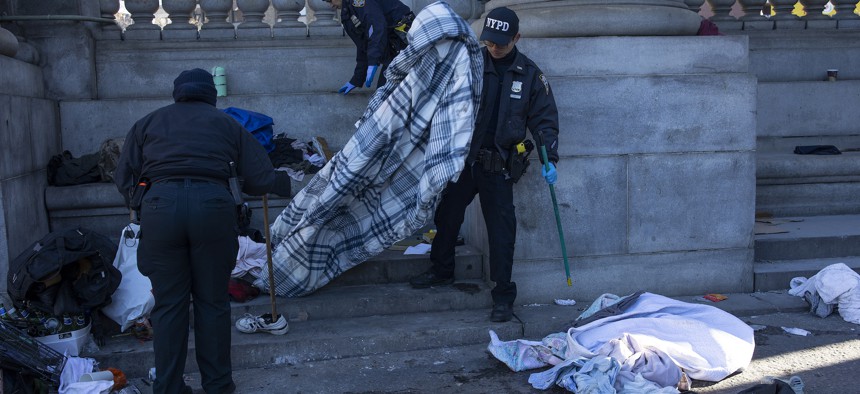Connecting state and local government leaders
New data shows that government assistance during the pandemic dramatically reduced homelessness. So why are cities and states increasingly turning to criminalization to address the issue?
Emergency rental assistance, eviction moratoriums, child tax credits—the pandemic catalyzed unprecedented federal support that kept people in their homes, and a new analysis reveals just how effective those policies were. But now, with much of that assistance ending, cities and states are preventing people from living on the streets by criminalizing homelessness.
The Department of Housing and Urban Development’s Annual Housing Assessment report documents the number of people using shelter services in a year. In the first full year of pandemic data, between October 2020 and September 2021, a little over 1.2 million people experienced sheltered homelessness, a noteworthy 17% decrease from the year before.
That figure varies across demographics and funding programs. Family homelessness, for instance, decreased 25% during that period. Between 2019 and 2021, unaccompanied youth experiencing homelessness dropped 24%. In 2021, Thirty-five percent fewer households moved to homeless shelters from a rental unit compared to 2019, a figure likely driven by eviction moratoriums.
“It was a welcome but not altogether unexpected finding to see that these resources really did make an impact on those numbers,” said Kim Johnson, public policy manager for the National Low Income Housing Coalition.
The report, published at the end of July, is the first analysis from the department to use a full year’s worth of data from the pandemic and focuses on sheltered homelessness, including people staying in emergency shelters or transitional housing. The annual analysis follows the more well-known point-in-time count, which tallies the number of people experiencing homelessness on a single night in January.
Billions of federal dollars funded emergency rental assistance programs, and many localities established eviction moratoriums that lasted longer than the federal government’s. Expanded child tax credits gave many low-income families an additional few thousand dollars each month, helping to cover housing costs and other essentials.
“But just as those protections expired and resources were depleted, renters with the lowest incomes reentered a brutal housing market, with skyrocketing rents and increased costs for food, gas, and other necessities,” Diane Yentel, president and CEO of the National Low Income Housing Coalition, said in a statement. “Now, renters with the lowest incomes are struggling more than ever, eviction filings have surpassed pre-pandemic levels and, as a result, homelessness is increasing in many communities.”
To make matters worse, some demographic groups saw an uptick in homelessness during the pandemic. Adults experiencing chronic homelessness rose by about 33% between 2019 and 2021. Among those aged 65 years and older, chronic homelessness increased by 73%.
The increase suggests that many older people are aging into chronic homelessness, the report notes. It also points to the insufficiency of Social Security benefits as the cost of living continues to rise, Johnson said.
Black, Indigenous and people of color continue to be overrepresented among people experiencing homelessness. While only representing about 13% of the national population, BIPOC individuals accounted for 39% of people experiencing homelessness.
Since pandemic assistance has largely ended, anecdotal information suggests housing instability has increased, Steve Berg, chief policy officer for the National Alliance to End Homelessness, said on a press call last week with homelessness advocacy groups.
But while the HUD report reveals just how powerful government assistance has been in reducing homelessness, cities and states are increasingly allocating resources toward policies that criminalize homelessness, an approach that experts consider to be at best inadequate and at worst harmful.
“We have seen a truly alarming increase in efforts to criminalize homelessness, which we know is highly ineffective,” said Alayna Calabro, a senior policy analyst for the National Low Income Housing Coalition.
Criminalization of homelessness fails to address the systemic causes of homelessness, said Eric Tars, senior policy director for the National Homelessness Law Center. The organization tracks homeless criminalization policies nationwide and has found that such policies have steadily become more common since the center began tracking them in 2006. Local decision-makers have been long enacting laws that prohibit sleeping or camping in public, panhandling and living in vehicles. In more recent years, states have also joined the trend, Tars added.
As the pandemic wanes, the combination of dwindling resources and people spending more time in public spaces is resulting in greater visibility of homeless people, ushering in a surge of new efforts to criminalize homelessness in states and localities, according to Tars.
Policies that fine and jail people experiencing homelessness perpetuate the problem and fail to address the systemic issues that cause homelessness, like scarce affordable housing. Criminalizing homelessness also draws resources away from initiatives that have proved to reduce homelessness.
“It's much easier to pass a quick ordinance that says people can't sleep on the corner and hide the costs of that in the jail budget, the police budgets, the courts budgets, even though it's going to cost ultimately two to three times more than it would to just simply provide housing,” Tars said
Peggy Bailey, vice president for housing and income security for the Center on Budget and Policy Priorities, held up veterans as a prime example of how ongoing support can dramatically reduce homelessness on last week’s press call. With dedicated support from programs like HUD’s Veteran Affairs Supportive Housing program, the number of homeless veterans dropped by more than 50% between 2009 and 2022.
“We do know what works: A housing-first intervention and wraparound support services are the way to end homelessness,” she said.
Currently, there are fewer federal resources to help address homelessness, but the HUD report can help communities understand where focused efforts, like tenant protections, can better support the most vulnerable populations, Calabro said.
“The report really shows that inextricable link between homelessness and housing instability and the really significant impact that protections and resources—federal, state and local—can have in reducing evictions.”

NEXT STORY: The Whole-Home Repairs program is remaking the housing landscape




